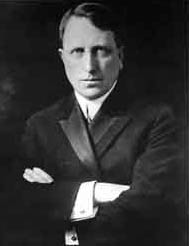 William Randolph Hearst was born in 1863 in San Francisco. He came from a very wealthy family and studied in Harvard, before being expelled for giving his professors chambers pots with their names painted on the inside.
William Randolph Hearst was born in 1863 in San Francisco. He came from a very wealthy family and studied in Harvard, before being expelled for giving his professors chambers pots with their names painted on the inside.Hearst got into publishing business in 1887 with the San Francisco Examiner, the newspaper his father purchased in 1880. Hearst did everything he could to improve the newspaper: he bought the best equipment of the time and hired very talented writers such as Mark Twain and Jack London. He was a populist, he wanted to write for the masses, and went on to expose scandals such as financial corruption. The San Francisco Examiner became one of the best-selling newspapers in town within a few years.
In 1896, Hearst bought the New York Morning Journal - a dying newspaper - and turned it into the best-selling newspaper in New York at the time. He did the same thing he did with the San Francisco Examiner: he hired very good and famous writers. But he tried something new, that nobody had done before: he published as many sensational stories as he could ( crime mostly), he designed loud headlines and he also published lots of cartoons. Finally, the price was set to only one cent. The New York Morning Journal was competing with the New York World, Joseph Pulitzer's newspaper. This type of newspapers became known as "yellow journalism", in reference to the Yellow Kid who was a comic strip character.
After his success with the New York Morning Journal, William Randolph Hearst decided to expand his business. He opened newspapers in Chicago, Los Angeles and Boston. Some of them were created to serve his political views, and by the mid twenties, he was the owner of 28 newspapers across the whole country (the Los Angeles Examiner, the Boston American, the Atlanta Georgian, the Chicago Examiner, the Detroit Times, the Seattle Post-Intelligencer, the Washington Times, the Washington Herald, and the San Francisco Examiner.)
But this was apparently not enough, as Hearst wanted then to diversify his business. He went into book publishing and magazines (Cosmopolitan, Good Housekeeping, Town and Country etc.)
Unfortunately, the Great Depression in 1929 hit really hard the economy, and the newspapers were on the first line. Hearst had a succession of debts and his company had to face reorganisation in the 1930s. The newspapers were liquidated.
William Randolph Hearst died of a heart attack in 1951.
In 1896, Hearst bought the New York Morning Journal - a dying newspaper - and turned it into the best-selling newspaper in New York at the time. He did the same thing he did with the San Francisco Examiner: he hired very good and famous writers. But he tried something new, that nobody had done before: he published as many sensational stories as he could ( crime mostly), he designed loud headlines and he also published lots of cartoons. Finally, the price was set to only one cent. The New York Morning Journal was competing with the New York World, Joseph Pulitzer's newspaper. This type of newspapers became known as "yellow journalism", in reference to the Yellow Kid who was a comic strip character.
After his success with the New York Morning Journal, William Randolph Hearst decided to expand his business. He opened newspapers in Chicago, Los Angeles and Boston. Some of them were created to serve his political views, and by the mid twenties, he was the owner of 28 newspapers across the whole country (the Los Angeles Examiner, the Boston American, the Atlanta Georgian, the Chicago Examiner, the Detroit Times, the Seattle Post-Intelligencer, the Washington Times, the Washington Herald, and the San Francisco Examiner.)
But this was apparently not enough, as Hearst wanted then to diversify his business. He went into book publishing and magazines (Cosmopolitan, Good Housekeeping, Town and Country etc.)
Unfortunately, the Great Depression in 1929 hit really hard the economy, and the newspapers were on the first line. Hearst had a succession of debts and his company had to face reorganisation in the 1930s. The newspapers were liquidated.
William Randolph Hearst died of a heart attack in 1951.
A film was made in 1941, Citizen Kane, which was directed by and starring Orson Welles. The movie relates the life of Charles Foster Kane, a character based upon Hearst's life. The film was nominated for Academy Awards in nine categories; it won an Academy Award for Best Writing (Original Screenplay) by Herman Mankiewicz and Welles.
0 comments:
Post a Comment